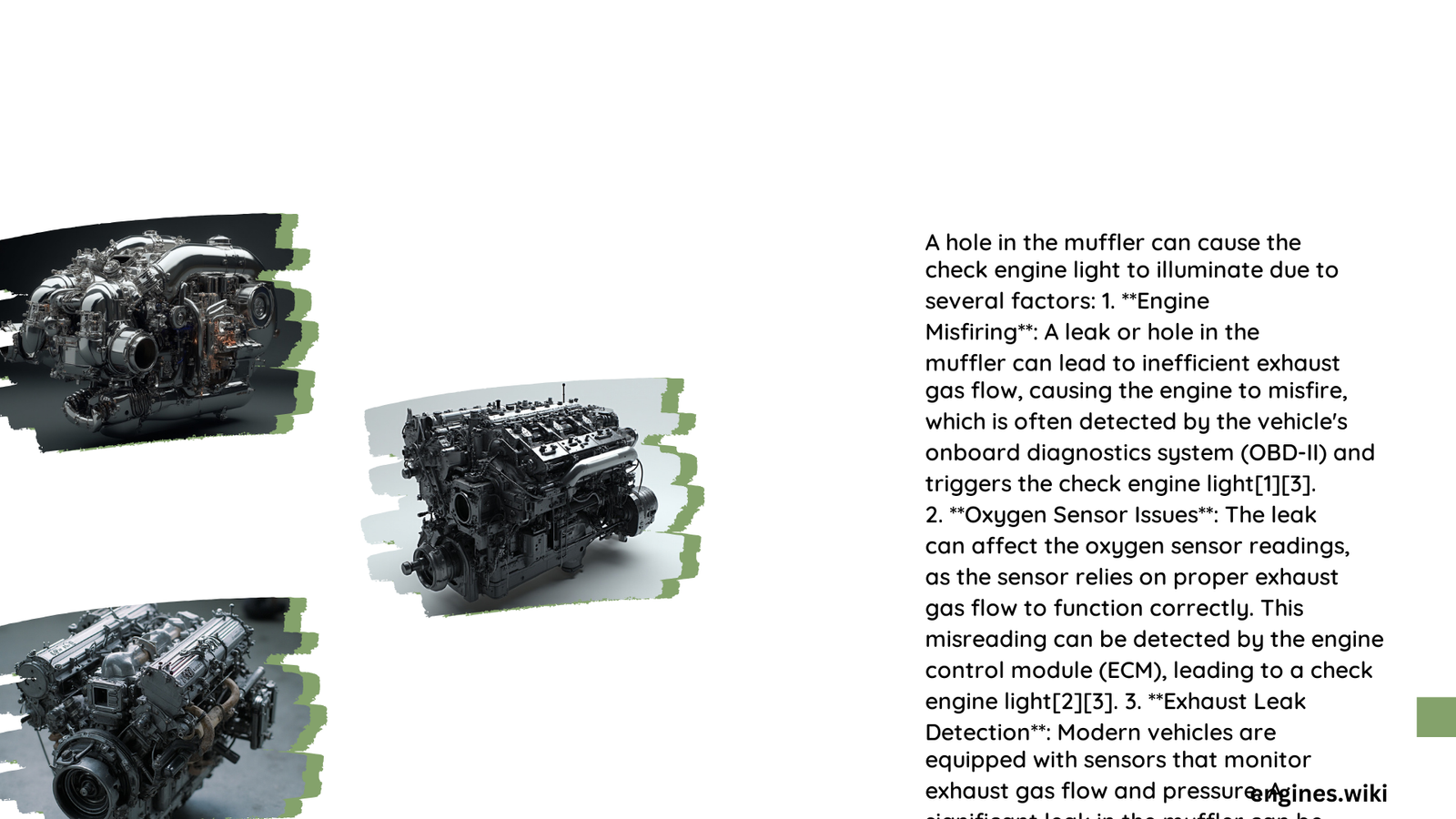A hole in the muffler or exhaust system can indeed trigger the check engine light under specific conditions. This issue primarily occurs when the exhaust leak is located before the oxygen sensors, affecting their readings and potentially triggering codes related to catalytic converter efficiency. However, if the leak is behind the rear oxygen sensor, it’s less likely to illuminate the check engine light. Understanding the relationship between exhaust system malfunctions and the check engine light is crucial for proper diagnosis and repair.
What Are the Symptoms of a Hole in the Muffler?
A hole in the muffler or an exhaust leak can manifest through several noticeable symptoms:
- Loud exhaust noise
- Decreased engine performance
- Reduced fuel efficiency
- Exhaust smell inside or outside the vehicle
Additionally, an exhaust leak can cause the oxygen sensors to provide incorrect readings, leading to issues such as:
- Random or multiple cylinder misfires (codes P0300-P0304)
- System running too lean (codes P0171 or P0174)
How Does an Exhaust Leak Affect the Check Engine Light?

The check engine light is triggered when the vehicle’s onboard diagnostics (OBD) system detects a problem affecting emissions or engine performance. An exhaust leak can impact the check engine light in the following ways:
-
Oxygen Sensor Readings: If the leak is before the oxygen sensors, it can alter their readings, indicating to the OBD system that the catalytic converter is not functioning correctly. This can lead to codes like P0420 or P0430.
-
Exhaust Gas Recirculation (EGR) System: An exhaust leak can affect the EGR system, potentially triggering codes like P0401 (Exhaust gas recirculation flow insufficient detected).
-
Air-Fuel Mixture: The leak can cause the engine to run lean, as unmetered air enters the exhaust system, leading to codes related to fuel trim issues.
What Are the Potential Costs and Timeframes for Repairing a Muffler Hole?
The costs and timeframes for diagnosing and repairing a hole in the muffler or an exhaust leak can vary based on several factors:
| Repair Stage | Estimated Cost | Estimated Time |
|---|---|---|
| Diagnosis | $50 – $150 | 30 minutes – 2 hours |
| Parts (Flex pipe or muffler) | $100 – $500 | N/A |
| Labor | $75 – $450 | 1 – 3 hours |
Note: These are general estimates and can vary significantly based on the vehicle make, model, and specific repair requirements.
What Challenges Might Arise During the Repair Process?
When addressing a hole in the muffler and its impact on the check engine light, several challenges may arise:
-
Accurate Diagnosis: Pinpointing the exact location of the exhaust leak can be challenging, especially if it’s small or in a hard-to-reach area.
-
Resetting the Computer: After repairs, the check engine light may remain on if the computer is not reset. This can be done using a code reader/scanner or by disconnecting the battery, though the latter is not recommended due to potential complications.
-
Ensuring Proper Repair: It’s crucial to fix the known problem first (e.g., replacing the flex pipe) and then check if the code disappears before proceeding with additional repairs.
-
Addressing Related Issues: An exhaust leak may have caused other problems that need attention, such as damage to oxygen sensors or the catalytic converter.
How Can You Prevent Future Muffler Holes and Check Engine Light Issues?
To minimize the risk of future muffler holes and related check engine light problems, consider the following preventive measures:
-
Regular Inspections: Have your exhaust system inspected annually or during routine maintenance.
-
Address Rust Early: If you notice rust on your exhaust components, have it addressed promptly to prevent holes from forming.
-
Avoid Road Salt: In areas where road salt is used, wash the undercarriage of your vehicle regularly to prevent corrosion.
-
Quality Repairs: When repairs are needed, use high-quality parts and ensure proper installation to prevent premature failure.
-
Prompt Attention to Warning Signs: If you hear unusual exhaust noises or smell exhaust fumes, have your vehicle checked immediately.
By understanding the relationship between muffler holes and the check engine light, and taking proactive measures, you can maintain your vehicle’s performance and avoid costly repairs. Remember that while a hole in the muffler can cause the check engine light to illuminate, it’s essential to have a professional diagnosis to determine the exact cause and appropriate solution.
References:
1. Car Talk Community: Catalytic Efficiency Code and Exhaust Leak
2. Master Autotech: Catalytic Converter Codes: DTC & Solutions
3. JustAnswer: Will a leak in my exhaust pipe trigger a check engine light?
